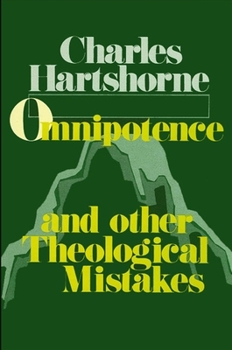Omnipotence and Other Theological Mistakes
Select Format
Select Condition 
Book Overview
This book presents Hartshorne's philosophical theology briefly, simply, and vividly.
Throughout the centuries some of the world's most brilliant philosophers and theologians have held and perpetuated six beliefs that give the word God a meaning untrue to its import in sacred writings or in active religious devotion:
God is absolutely perfect and therefore unchangeable,
2.omnipotence,
3.omniscience,
4.God's unsympathetic goodness,
5.immortality as a career after death, and
6.revelation as infalliable.
Charles Hartshorne deals with these six theological mistakes from the standpoint of his process theology.
Hartshorne says, "The book is unacademic in so far as I am capable of being that." Only a master like Hartshorne could present such sophisticated ideas so simply. This book offers an option for religious belief not heretofore available to lay people.
Related Subjects
Christian Books & Bibles Education & Reference Religion Religion & Spirituality Theology




